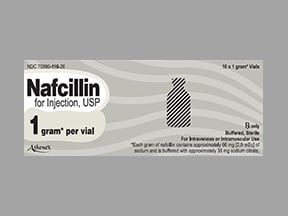
Nafcillin Coupons & Savings Card – Discount Prices from $5.97
This medication is a penicillin-type antibiotic used to treat various bacterial infections. It functions by inhibiting the growth of bacteria.
Our coupons are free to use. Before paying, show the pharmacist your Nafcillin savings card to get your free discount. Use our filters below to edit the prescription box to match your needs. The Nafcillin prices will update based on your prescription needs. Above our Nafcillin coupons, you can change your location to see pharmacy prices and costs in other areas. We're here to help you buy Nafcillin at the lowest price with our prescription discount card.
My prescription
Edit
1GM, Nafcillin (1 Solution Reconstituted)
Select pharmacy

CVS
$29.53
COUPON PRICE
Walmart
$5.97
COUPON PRICE
Albertsons
$9.97
COUPON PRICE
Walgreens
$13.82
COUPON PRICENafcillin savings card
Show this card to your pharmacist
Walmart
$5.97
BIN
ID
PCN
GRP
019876
LH82226EAC
CHIPPO
LHX
Powered by
This medication is a penicillin-type antibiotic used to treat various bacterial infections. It functions by inhibiting the growth of bacteria.
Our coupons are free to use. Before paying, show the pharmacist your Nafcillin savings card to get your free discount. Use our filters below to edit the prescription box to match your needs. The Nafcillin prices will update based on your prescription needs. Above our Nafcillin coupons, you can change your location to see pharmacy prices and costs in other areas. We're here to help you buy Nafcillin at the lowest price with our prescription discount card.
Nafcillin dosage forms
Use our Nafcillin 1GM coupon with prices from $5.97 for 1 Solution Reconstituted. You can also use our Nafcillin 1GM coupon with prices from $32.16 for 10 Solution Reconstituteds. We have a Nafcillin 2GM coupon with prices from $7.01 for 1 Solution Reconstituted. You can use our Nafcillin 2GM coupon with prices from $34.50 for 10 Solution Reconstituteds.
Dosage Quantity Price from Per unit 1GM 1 Solution Reconstituted $5.97 $5.97 1GM 10 Solution Reconstituteds $32.16 $3.22 2GM 1 Solution Reconstituted $7.01 $7.01 2GM 10 Solution Reconstituteds $34.50 $3.45
| Dosage | Quantity | Price from | Per unit |
|---|---|---|---|
| 1GM | 1 Solution Reconstituted | $5.97 | $5.97 |
| 1GM | 10 Solution Reconstituteds | $32.16 | $3.22 |
| 2GM | 1 Solution Reconstituted | $7.01 | $7.01 |
| 2GM | 10 Solution Reconstituteds | $34.50 | $3.45 |
